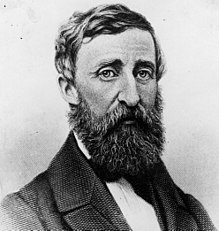|
Walking (Thoreau)

Transcendentalism in Walking/Form"Walking" is a transcendental essay that analyzes the relationship between man and nature, trying to find a balance between society and our raw animal nature. [citation needed] Themes
Writing Style“Walking” has an autobiographical side, and reflects the author’s personal experiences.[2] As Rebecca Solnit has stated in “Wanderlust: A History of Walking”, the rhythm of walking could be the sources of music, conversation, thoughts, and literature.[3] In over ten years of walking, Thoreau kept observing nature, organizing his thought, and considering the best way to express his lecture; his diary shows what elements in his daily life influenced his environmental view and motivated him to write it. Above all, the author’s correspondence with friends provides not only his lecture career but also his works and his writing process. As a result, his essay is told by the voice of the confident narrator, given some authority.[4] Moreover, using allusion, he succeeded in not only understanding the essay broader but also obtaining a form of poetry, and with his lecture and the new writing style, “Walking” became a new critique of the existing society. See also
References
External linksWikisource has original text related to this article:
|
Portal di Ensiklopedia Dunia
